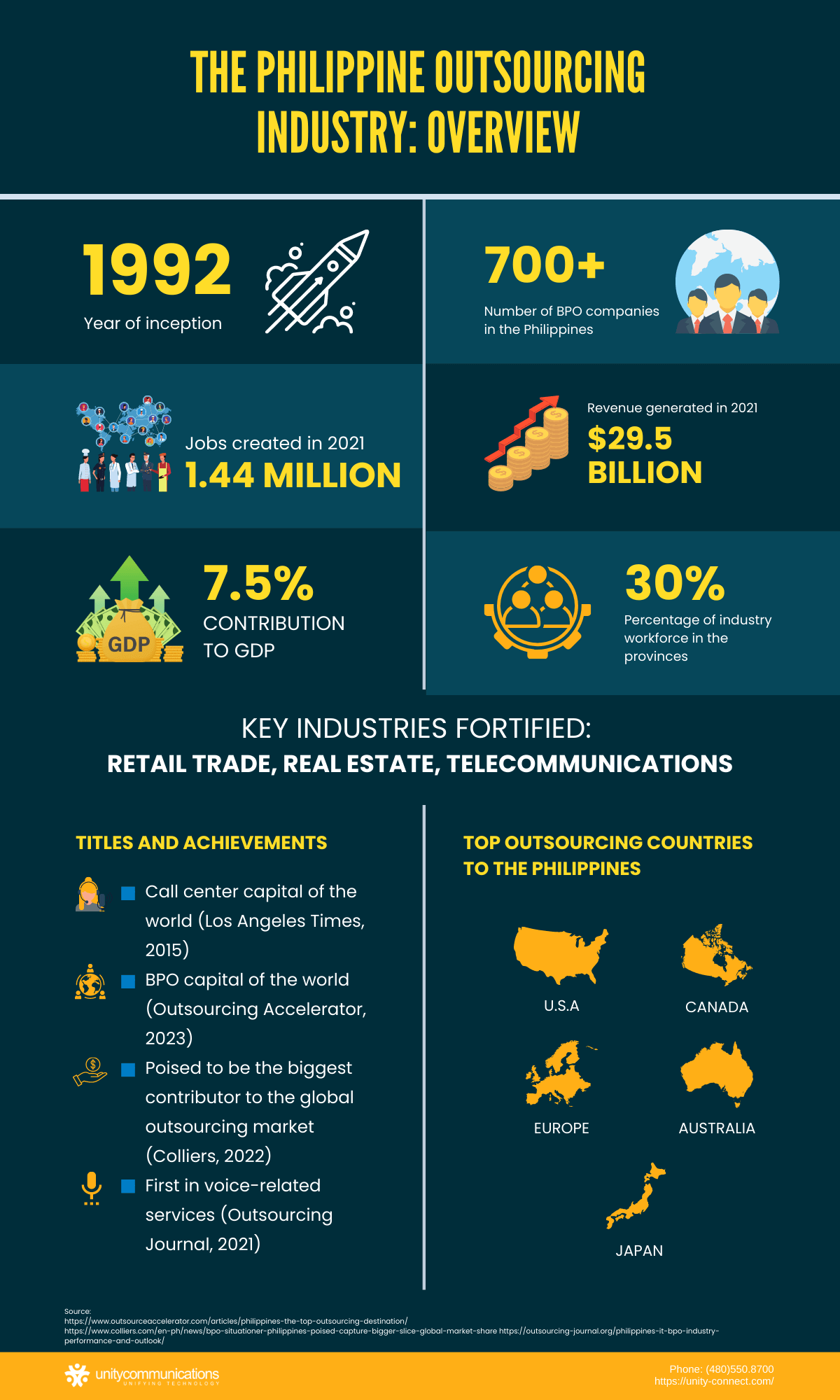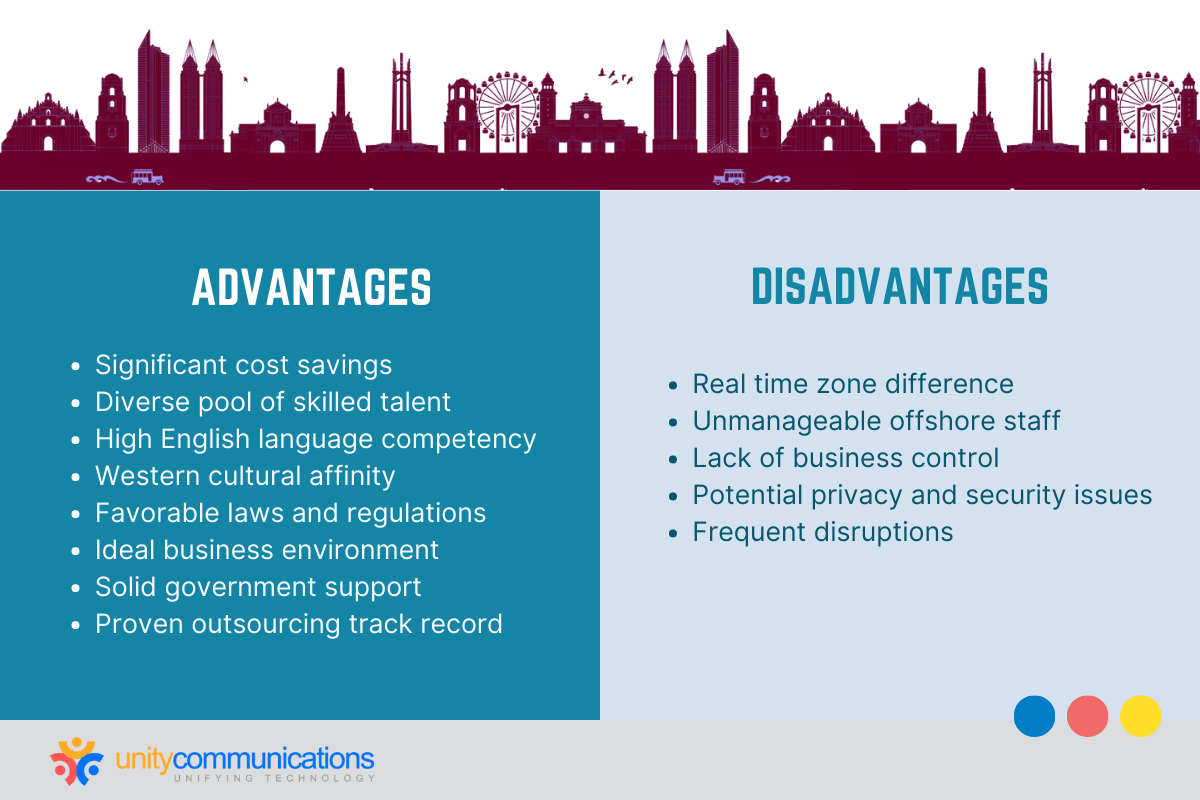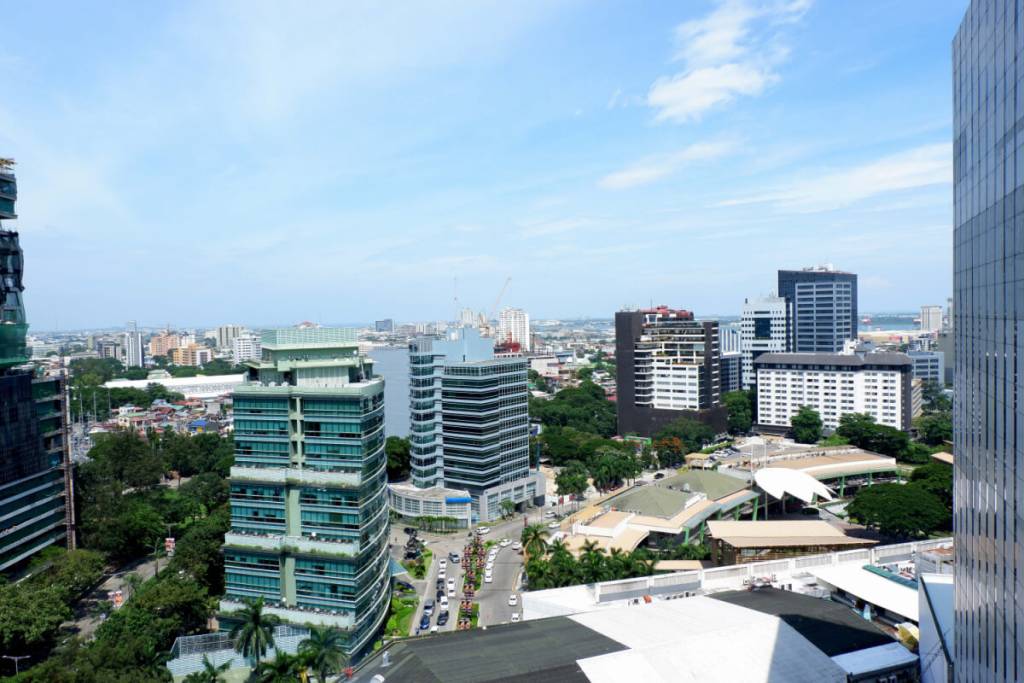IN THIS ARTICLE
Table of Contents
Offshore outsourcing is a feasible business strategy for companies looking to cut costs and streamline operations. With its lower labor costs, full government support, and favorable business environment, the Philippines tops the list of outsourcing hubs.
But how do you find and hire an offshoring provider in the Philippines? This page tackles everything you need to know about offshore outsourcing to the Philippines.
Read until the end to learn more about:
- The outsourced services the country offers,
- Its potential benefits and risks, and
- Best practices for outsourcing.
What Is Offshore Outsourcing?
Offshore outsourcing is delegating some aspects of your business to a service provider in another country. For example, your U.S.-based company outsources customer service to a third-party vendor in the Philippines and information technology (IT) support to a company in India.
Businesses of all sizes employ offshore outsourcing to capitalize on lower labor costs, service efficiency, and other perks. The Philippines is a perfect example of a top business process outsourcing (BPO) destination.
Learn more about offshore outsourcing to the Philippines in the next section.
An Overview of Offshore Outsourcing to the Philippines

Offshore outsourcing to the Philippines has become a popular business strategy. Since its humble beginning, the country’s IT and business process management (BPM) sector has come a long way.
The Philippine outsourcing industry began in 1992. Back then, Accenture was the first to offer outsourced services in the country. Sykes established the first multinational company, and eTelecare Global Solutions later set up the first call center. These two examples of outsourcing companies in the Philippines had a big hand in growing the industry exponentially. Now, over 700 BPO companies are in the Philippines.
The IT-BPM industry is a significant contributor to the Philippine economy. The Business Process Association of the Philippines (IBPAP) highlights a few of its key milestones:
- The sector created 1.44 million jobs in 2021, making it the biggest job generator in the country.
- It generated $29.5 billion in revenue, contributing 7.5% to the country’s gross domestic product (GDP).
- It expanded its reach to the provinces, where 30% of the total industry workforce resides.
- It seeks to fortify top industries such as retail trade, real estate, and telecommunications.
The Philippines earned its reputation as a top outsourcing hub because it achieved the titles and achievements listed below:
- Call center capital of the world (Los Angeles Times, 2015)
- BPO capital of the world (Outsourcing Accelerator, 2023)
- Poised to be the biggest contributor to the global outsourcing market (Colliers, 2022)
- First in voice-related services (Outsourcing Journal, 2021)
The Philippines also caters to various countries worldwide. The following top nations outsource to the Philippines:
- U.S.A.
- Canada
- Europe
- Australia
- Japan
The country’s excellent track record, business recognition, and global contribution solidify its position in the outsourcing industry. With its continuous growth and expansion, the country’s IT-BPM industry will likely prosper. As such, businesses should consider offshore outsourcing to the Philippines.
Services Offered by Philippine Outsourcing Companies

The Philippines offers front- and back-office outsourcing services to clients across different sectors. Offshore outsourcing to the Philippines includes business verticals such as:
- Banking, financial services, and insurance (BFSI)
- IT and telecommunications
- Healthcare
- Retail and e-commerce
- Manufacturing
Discover the industry services offered by offshore outsourcing companies in the Philippines below.
1. Interactive Contact Center Services
The Philippines is known for its call centers. The country’s skilled workforce, English proficiency, and cultural affinity with the West make it ideal for outsourcing customer-facing tasks. However, many BPO companies have transitioned from call centers to contact centers. They now use contact center as a service (CCaaS) platforms to support multiple communication channels.
Below are contact center services offered by BPO companies in the Philippines.
| Outsourcing Service | Task Description |
|---|---|
| Customer service | Answer customer questions, process order requests, and resolve issues |
| Sales or telemarketing | Contact potential and existing customers to sell products and services |
| Billing and collections | Call customers to address billing inquiries and collect payments |
2. Robust IT and Tech-related Services
The Philippines has become a top outsourcing hub for IT and tech-related services. Offshore outsourcing companies provide various services such as:
- Hardware and software troubleshooting
- Software development
- Network management
- IT security and compliance
The country’s tech-savvy workforce, expanding infrastructure, and digital environment make it a top choice. You can choose an IT-BPO vendor or managed service provider (MSP) for IT or technical support outsourcing.
Here are some IT and tech-related services to consider for your offshore outsourcing engagement in the Philippines.
| Outsourcing Service | Task Description |
|---|---|
| IT support | Provide technical assistance (hardware and software installation, maintenance, and troubleshooting) |
| Technical support | Assist end users with technology products (desktop computers, mobile phones, and other electronic devices) |
| Help desk support | Offer end users a single point of contact (SPOC) for customer inquiries and technical issues |
3. Growing Healthcare Outsourcing Services
Healthcare outsourcing has recently exploded in popularity, further accelerated by the pandemic. Its global market size could grow from $334.15 billion in 2021 to $755.76 billion by 2030 at a compound annual growth rate (CAGR) of 9.5%.
Healthcare outsourcing services are in high demand. Many healthcare providers capitalize on the country’s supply of healthcare professionals. They entrust non-clinical tasks to offshoring providers to cut expenses and prioritize medical care.
Let us look at some healthcare outsourcing services offered in the Philippines.
| Outsourcing Service | Task Description |
|---|---|
| Medical billing | Generate medical bills (using HCPCS, ICD, and CPT codes) and file claims for healthcare services |
| Claims processing | Review and adjudicate submitted healthcare claims, and pay insurance companies for covered medical services |
| Medical transcription | Turn medical reports dictated by healthcare professionals into written documents |
4. Expanding E-commerce Outsourcing Services
Many entrepreneurs have launched online stores during the pandemic. Likewise, consumers increasingly rely on digital platforms for their purchases. As a result, e-commerce outsourcing is at its peak.
Online businesses hire offshore outsourcing companies in the Philippines to optimize operations and reduce expenses. They usually outsource e-commerce customer support, order processing, and data entry services.
Let us delve into common e-commerce tasks outsourced to the Philippines.
| Outsourcing Service | Task Description |
|---|---|
| Data entry | Record, organize, and secure data (business and customer information) |
| Order fulfillment | Manage the entire customer buying process (from receiving orders to delivering products) |
| Inventory management | Track the e-commerce business’ resources (raw materials, essential components, and finished products) |
5. Optimized Administrative Services
Companies usually have several departments integral to business operations. But small and midsize businesses (SMBs) outsource administrative functions to focus on core operations. That is where outsourcing to the Philippines comes in.
Outsourcing administrative tasks to the Philippines offers cost-effective solutions. The country’s skilled and trained workforce makes it an attractive destination for such services. Below are administrative functions commonly outsourced to the Philippines.
| Outsourcing Service | Task Description |
|---|---|
| Accounting and financial services (A&F) | Maintain the company’s financial health (through bookkeeping, financial reporting, and tax compliance) |
| Payroll outsourcing | Manage payroll salaries (through employee data management, salary disbursement, benefits management, and tax filing) |
| Human resource (HR) outsourcing | Oversee the company’s recruitment, onboarding, and employee performance |
Potential Benefits and Risks of Offshore Outsourcing to the Philippines

As mentioned, offshore providers in the Philippines help reduce costs, optimize processes, and more. Any business venture, however, comes with possible challenges and obstacles. Weigh the pros and cons of outsourcing before taking the plunge.
Let us explore the benefits and risks of offshore outsourcing to the Philippines.
The Advantages of Offshore Outsourcing to the Philippines
Take advantage of the benefits below when working with an offshore provider in the country.
- Significant Cost Savings. Philippine offshoring is particularly known for its cost savings. The country’s low cost of living helps reduce labor and operating expenses by up to 50% and 60% respectively. Despite this, the nation has a skilled workforce that can help increase efficiency and productivity.
- Diverse Pool of Skilled Talent. Globalization provides easy access to a talented workforce to address labor scarcity. The Philippines, in particular, has a diverse talent pool with different educational backgrounds. The country is an ideal outsourcing hub due to its English-proficient, customer-oriented, and hardworking workers.
- High English Language Competency. As the official global language, English is vital for business interactions. Most Filipinos understand and speak the language because it is the primary medium of instruction. Such proficiency gives the Philippines a competitive edge in the BPO industry.
- Western Cultural Affinity. Cultural compatibility is crucial in outsourcing to avoid misunderstandings and conflicts. The Philippines has a long-standing past relationship with the U.S., resulting in shared cultural traits. Its ongoing partnership makes outsourcing highly feasible and effective in the country.
- Favorable Laws and Regulations. The Philippine government has laws and regulations ideal for foreign investments. The Special Economic Zone (SEZ) Act provides tax incentives to outsourcing companies in ecozones. The Foreign Investments Act and the Omnibus Investments Code also support foreign investors. These factors help reduce service costs for outsourcing clients.
- Ideal Business Environment. The country’s economic policies and regulations are welcoming to businesses. It landed 15th in the 2023 Tholons Global Business Innovation Sustainability Index. The country scored high in super cities, business diversity, and equity and inclusion (DEI) areas, making it an ideal business environment.
- Solid Government Support. The Philippine government is a strong supporter of the BPO industry. Consider the SEZ enactment and Philippine Economic Zone Authority (PEZA) establishment that attract foreign investments. These initiatives show the government’s commitment to creating a business-friendly environment.
- Proven Outsourcing Track Record. The Philippines has served businesses for over two decades now. Its competitive pricing, skilled workforce, ideal business environment, and full government support solidify its BPO track record. That is why the nation has become the world’s BPO capital.
The Disadvantages of Offshore Outsourcing to the Philippines
Beware of the possible risks when hiring an offshore provider in the country.
- Real Time Zone Difference. Offshore outsourcing to the Philippines involves time zone differences that might hinder employee communication and customer interaction. To solve this, orient your third-party team on the difference. Schedule regular check-ins and meetings that work for both parties.
- Unmanageable Offshore Staff. Managing a team of contractors in the Philippines can be challenging due to the distance. Make sure to create a working environment that encourages constant communication and collaboration. Establish a quality assurance (QA) team and provide regular training and support.
- Lack of Business Control. Offshore outsourcing can result in a loss of some business control. Issues arise when you delegate tasks to the wrong vendor and have few interactions. Hire the right BPO partner who shares your values and culture. Most importantly, open lines of communication and maintain constant collaboration.
- Potential Privacy and Security Issues. Offshore outsourcing entails entrusting your business functions to a third-party vendor. This means exposing your business information to them and risking data to cyberattacks. Establish privacy policies and security protocols for your offshore team to follow strictly.
- Frequent Disruptions. Outsourcing to the Philippines might lead to disruptions due to natural calamities, geopolitical issues, and public holidays. To prepare for these events, maintain an in-house team and establish a contingency plan. Proper planning and preparation are key to minimizing the impact.
Best Practices for Offshore Outsourcing to the Philippines

At this point, you have learned so much about the pros and cons of offshore outsourcing to the Philippines. While you enjoy its potential benefits, you might encounter some inevitable challenges.
The key is implementing best practices to make your outsourcing engagement successful. Consider the outsourcing strategies below if you outsource tech solutions or customer service.
1. Study the Philippine Outsourcing Market
Before outsourcing to the Philippines, research the country’s outsourcing market. Consider the following:
- BPO Market Growth. The Philippine IT-BPM market should have reached $29 billion last year, comprising 13% of the global BPO market share. It ranks first in voice-related services and seeks to expand its non-voice BPM and IT services. If you plan to outsource to the country, capitalize on the industry’s market growth.
- Industry Segments and Services. The primary verticals to outsource in the Philippines are the BFSI, IT and telecom, healthcare, and manufacturing. If your business belongs to these niches, consider offshoring to the country. Take note of the outsourcing services above to know what to outsource.
- Business Location. At the onset, most BPO companies were located in Metro Manila, Clark, and Cebu. In 2010, IBPAP named the Next Wave Cities such as Davao, Iloilo, and Baguio. Recently, the organization launched Digital Cities 2025, an initiative to turn areas outside big cities into full-fledged digital hubs.
Understanding the BPO landscape in the Philippines helps you make informed decisions.
2. Check the Philippine Laws and Regulations
Research the country’s legal and regulatory environment to ensure you are making the right decision in choosing an outsourcing partner in the Philippines.
Apart from those mentioned above, here are some laws and regulations governing the country’s outsourcing industry:
- Data Privacy Act of 2012. This law regulates the collection, usage, and storage of personal data in the Philippines.
- The DITC Act of 2015. The Department of Information and Communications Technology (DITC) regulates information and communication technology use in the Philippines.
- Telecommuting Act. The Philippines recognizes telecommuting as a legitimate work arrangement and protects the rights of telecommuting employees.
- Department Circular No. 1, Series of 2008. The Department of Labor and Employment (DOLE) provides guidelines for the safety and health of employees in the call center industry.
- Department Advisory No. 4, Series of 2010. The DOLE sets out guidelines for flexible work arrangements, including directions for female BPO night shift employees.
Understand all these by heart to avoid legal and compliance issues when outsourcing to the country.
3. Choose the Right Offshoring Provider
Offshore outsourcing to the Philippines is a viable solution for scaling operations. The key to outsourcing success is choosing the right offshore provider. To create a list of prospects, search online and get recommendations from other professionals.
Once you have a list of service providers, screen them based on the key factors below:
- Experience. Consider the prospect’s outsourcing experience, longevity, and service quality.
- Expertise. Look for an offshore provider specializing in your niche or industry.
- Workforce. Your potential BPO partner must have the knowledge and skills required for your business functions.
- Technology. Make sure the offshore provider has the latest technological resources.
- Reputation. Check the offshore provider’s credentials, from business licenses and certifications to BPO awards and recognition.
- Cost: Choose an offshore provider that can help you save money in the long run.
With these in mind, you can pick an offshore provider that best fits your needs and budget.
4. Create a Service-level Agreement (SLA)
Once you have chosen an offshore provider in the Philippines, create an SLA. This legally binding contract defines your business partnerships with your hired provider. Include the following in the contract:
- Business goals, including operational objectives for outsourcing
- Critical metrics with specific key performance indicators (KPIs)
- Work scope, including agents’ roles and responsibilities
- Processes with clear standard operating procedures (SOPs)
- Legal and financial consequences of a contract breach
The SLA guides you and your hired offshore provider throughout the outsourcing engagement. This contract is crucial to your success since it sets clear expectations for both parties.
5. Ensure Constant Communication, Collaboration, and Monitoring
Offshore outsourcing to the Philippines entails two companies in different countries working together. As you can see, outsourcing is a business partnership. You do not entrust your processes entirely to a third party. Instead, it requires the following key factors:
- Communication. Maintain open lines of communication with your offshore provider. Schedule regular meetings.
- Collaboration. Regularly coordinate with your hired provider. Work together for effective project management.
- Monitoring. Track your BPO performance and measure its progress to help you keep meeting expectations and see the areas for improvement to address.
Through these, you can build successful partnerships with your offshore provider, leading to a fruitful outsourcing engagement.
The Bottom Line
The Philippines is a trusted partner for many companies worldwide. Such trust is due to its highly skilled workforce, welcoming business climate, and solid government support. But be ready for challenges such as cultural differences and communication barriers.
Partner with a reputable offshoring provider to mitigate the risks and unlock the benefits of offshore outsourcing. Consider adopting the best practices for outsourcing provided here.
Offshore outsourcing to the Philippines is a viable solution for businesses seeking to reduce costs and optimize operations. Whether you run a small business or a multinational corporation, partnering with a Philippine service provider will surely not disappoint you.





